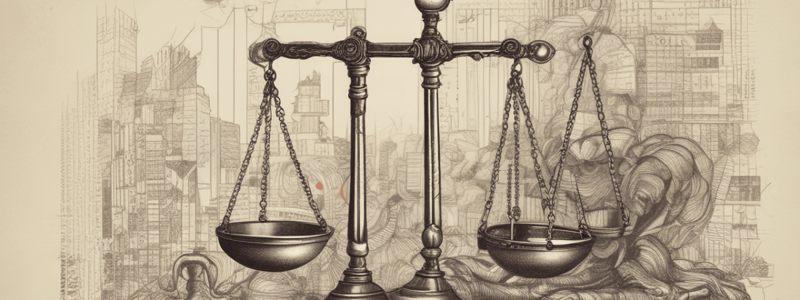Podcast
Questions and Answers
In order to prove that a defendant is guilty, the prosecution only needs to identify the actus reus of the offence.
In order to prove that a defendant is guilty, the prosecution only needs to identify the actus reus of the offence.
False (B)
The actus reus of an offence includes the defendant's state of mind.
The actus reus of an offence includes the defendant's state of mind.
False (B)
Strict liability offences require a mens rea.
Strict liability offences require a mens rea.
False (B)
The Theft Act 1968 defines theft as appropriating property belonging to another with the intention of temporarily depriving the other of it.
The Theft Act 1968 defines theft as appropriating property belonging to another with the intention of temporarily depriving the other of it.
The circumstance element of a criminal offence refers to the outcome or result of the defendant's conduct.
The circumstance element of a criminal offence refers to the outcome or result of the defendant's conduct.
Possession can be considered a form of omission.
Possession can be considered a form of omission.
In R v Stone and Dobinson, the defendants were charged with gross negligence manslaughter due to their failure to help the victim, who was the sister of the lodger.
In R v Stone and Dobinson, the defendants were charged with gross negligence manslaughter due to their failure to help the victim, who was the sister of the lodger.
In R v Ruffel, the defendant was found guilty of gross negligence manslaughter due to his failure to assume care for the victim who was overdosing.
In R v Ruffel, the defendant was found guilty of gross negligence manslaughter due to his failure to assume care for the victim who was overdosing.
R v Miller is a case about the creation of danger through reckless behavior.
R v Miller is a case about the creation of danger through reckless behavior.
The defendant in R v Gemma Evans was charged with gross negligence manslaughter because she failed to help her sister who was overdosing.
The defendant in R v Gemma Evans was charged with gross negligence manslaughter because she failed to help her sister who was overdosing.
The defendant was charged with gross negligence manslaughter in R v Stone and Dobinson because they were mentally impaired.
The defendant was charged with gross negligence manslaughter in R v Stone and Dobinson because they were mentally impaired.
In R v Ruffel, the defendant was found guilty of gross negligence manslaughter because he left the victim outside after trying to revive him.
In R v Ruffel, the defendant was found guilty of gross negligence manslaughter because he left the victim outside after trying to revive him.
All criminal cases require a positive act to fulfill the conduct element.
All criminal cases require a positive act to fulfill the conduct element.
Omissions can never fulfill the actus reus conduct element.
Omissions can never fulfill the actus reus conduct element.
In order to be liable, a defendant must always cause a specific result.
In order to be liable, a defendant must always cause a specific result.
There is a general duty to act in criminal law.
There is a general duty to act in criminal law.
A person can be liable for an omission if they have a familial relationship with the victim.
A person can be liable for an omission if they have a familial relationship with the victim.
A person can be liable for an omission if they have a contractual duty to act.
A person can be liable for an omission if they have a contractual duty to act.
A person can be liable for an omission if they have created a danger.
A person can be liable for an omission if they have created a danger.
In order to be liable for an omission, a person must have a duty to act, and breach that duty.
In order to be liable for an omission, a person must have a duty to act, and breach that duty.
The removal of life support is considered an act that can fulfill the actus reus conduct element.
The removal of life support is considered an act that can fulfill the actus reus conduct element.
All crimes require a result element.
All crimes require a result element.
What is the term used to describe the requirement that the prosecution show that the defendant did the act and at the same time had the mens rea of the offence?
What is the term used to describe the requirement that the prosecution show that the defendant did the act and at the same time had the mens rea of the offence?
What is the element of an offence that refers to the factual context needed for liability?
What is the element of an offence that refers to the factual context needed for liability?
What type of offences do not require a mens rea?
What type of offences do not require a mens rea?
What is the term used to describe a defendant's physical conduct or omissions needed for liability?
What is the term used to describe a defendant's physical conduct or omissions needed for liability?
What is a common factor in the cases of R v Stone and Dobinson, and R v Ruffel?
What is a common factor in the cases of R v Stone and Dobinson, and R v Ruffel?
What is an example of a state of affairs that can be considered a form of conduct?
What is an example of a state of affairs that can be considered a form of conduct?
What is the key element in the creation of danger cases, such as R v Miller?
What is the key element in the creation of danger cases, such as R v Miller?
What is the term used to describe the physical act or omission that fulfills the actus reus of an offence?
What is the term used to describe the physical act or omission that fulfills the actus reus of an offence?
What is the necessary condition for a person to be liable for an omission?
What is the necessary condition for a person to be liable for an omission?
What is the outcome of the defendant's conduct in the circumstance element of a criminal offence?
What is the outcome of the defendant's conduct in the circumstance element of a criminal offence?
What is the key difference between R v Stone and Dobinson, and R v Ruffel?
What is the key difference between R v Stone and Dobinson, and R v Ruffel?
What is the significance of the defendant's action in R v Gemma Evans?
What is the significance of the defendant's action in R v Gemma Evans?
What is a common feature of criminal cases?
What is a common feature of criminal cases?
What is the key difference between an act and an omission in criminal law?
What is the key difference between an act and an omission in criminal law?
What is required to establish the result element of a criminal offence?
What is required to establish the result element of a criminal offence?
What is the term for the surrounding facts that are not performed by the defendant and not caused by the defendant's action?
What is the term for the surrounding facts that are not performed by the defendant and not caused by the defendant's action?
What is the principle in the case of Airedale NHS Trust v Bland?
What is the principle in the case of Airedale NHS Trust v Bland?
In which situation can a person be liable for an omission?
In which situation can a person be liable for an omission?
What is the term for the outcome or event that the defendant must cause in order to be liable for a criminal offence?
What is the term for the outcome or event that the defendant must cause in order to be liable for a criminal offence?
In which case was the defendant charged with misconduct in a public office for failing to intervene in an incident?
In which case was the defendant charged with misconduct in a public office for failing to intervene in an incident?
What is the key principle in criminal law regarding omissions?
What is the key principle in criminal law regarding omissions?
What is the term for the requirement that the defendant's conduct must have caused a specific result, and that there must be a causal connection between the conduct and the result?
What is the term for the requirement that the defendant's conduct must have caused a specific result, and that there must be a causal connection between the conduct and the result?
Flashcards are hidden until you start studying
Study Notes
Actus Reus
- A guilty act (actus reus) and a guilty mind (mens rea) are the two essential elements of a crime
- Internal structure of an offence: AR + MR + lack of defences = criminal offence
- Strict liability offences do not require a mens rea
Breakdown of an Offence
- Conduct: Defendants' physical conduct or omissions needed for liability
- Circumstance: Factual context needed for liability
- Result: Outcomes or things caused by the defendant needed for liability
Dimensions of a Criminal Offence
- Conduct element: Acts, omissions, possession, or state of affairs
- Circumstance element: External circumstances, such as victim not consenting or property belonging to another
- Result element: Required outcomes or events caused by the defendant's conduct
Conduct Element
- Acts: Physical conduct needed for liability
- Omissions: Failing to act, with three ingredients: recognised offence capable by omission, a duty to act, and a breach of that duty
- Possession: Acting to gain possession or not dispensing of an item, linked to state of affairs
- State of affairs: Does not require positive action, e.g., professing to be a member of a terrorist organisation
Omissions
- There is no general duty to act in criminal law, making omissions not criminal by default
- Omissions can fulfill the actus reus conduct element in certain crimes
- Criminalising omissions: Interests of autonomy generally outweigh the interest in criminalising omissions
- To be held liable for an omission, three things are recognised:
- Offence is capable by being committed by omission
- Legally recognised duty to act
- A breach of that duty
Omission Duty Situations
- 5 situations where duty to act has been identified:
- Due to specifics of an offence (by definition)
- Under contract
- Familial or special relationship
- Assumption of care
- Creation of danger
Examples of Omission Duty Situations
- Duty due to specifics of an offence: R v Dytham (police officer failed to intervene in an incident), s38B Terrorism Act 2000, and s170 Road Traffic Act 1988
- Contractual duty: R v Pitwood (railway crossing gatekeeper failed to close gate)
- Duty to familial or special relationship: R v Gibbons and Proctor (not feeding child), R v Hood (not summoning help after wife fell)
- Assumption of care: R v Nicholls (grandmother neglected child), R v Instan (niece moved into defendant's home)
Case Law
- Winzar v Chief Constable of Kent: Defendant was found drunk on the highway and was guilty of section 12 offence
- Airedale NHS Trust v Bland: Removal of life support is permitted and does not amount to murder, as it is an omission
- R v Miller: Defendant lit a cigarette and did not put out the fire he started, guilty of an offence
- R v Gemma Evans: Defendant did not summon medical help after sister was overdosing, guilty of an offence
Studying That Suits You
Use AI to generate personalized quizzes and flashcards to suit your learning preferences.




